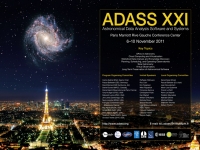The AstroDAbis Tagging Service: tags and cross-matches for remote catalogues
Norman Gray (University of Glasgow), Robert G Mann (University of Edinburgh, UK)
Dave Morris (University of Bristol, UK)
Mark Holliman (University of Edinburgh, UK)
Keith Noddle (University of Edinburgh, UK)
Abstract
Astronomers are very good at sharing data, but poorer at sharing knowledge. The AstroDAbis service helps share two types of knowledge:
* the results of, or raw information for, cross-matching, in the form of
co-identifications or neighbour tables; and
* information about single objects, in the form of user-supplied tags.
Almost all astronomical data ends up in open archives, and access to these is being simplified by the development of the global Virtual Observatory (VO). This is a great advance, but the fundamental problem remains that these archives contain only basic observational data, whereas all the astrophysical interpretation of that data -- which source is a quasar, which a low-mass star, and which an image artefact -- is contained in journal papers, with very little linkage back from the literature to the original data archives. It is therefore currently impossible for an astronomer to pose a query like �give me all sources in this data archive that have been identified as quasars� and this limits the effective exploitation of these archives, as the user of an archive has no direct means of taking advantage of the knowledge derived by its previous users.
The AstroDAbis service aims to address this, in a prototype service enabling astronomers to record tags and cross-identifications in the AstroDAbis service, annotating objects in other catalogues. We have deployed two interfaces to the annotations, namely one astronomy-specific one using the TAP protocol, and a second exploiting generic Linked Open Data (LOD) and RDF techniques.
Poster in PDF format
Paper ID: P051
Poster Instructions

